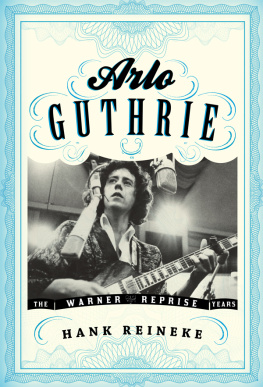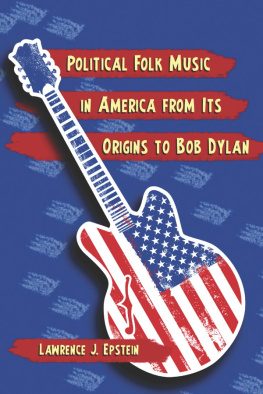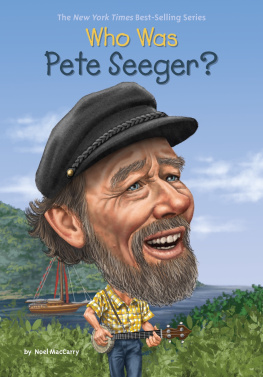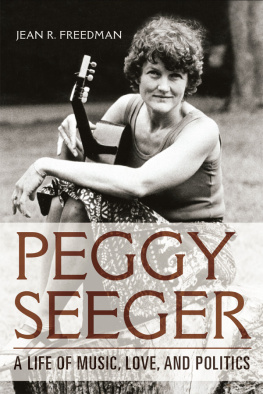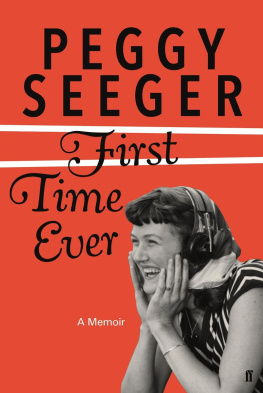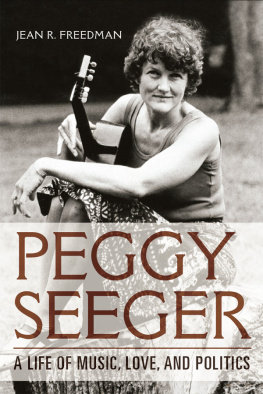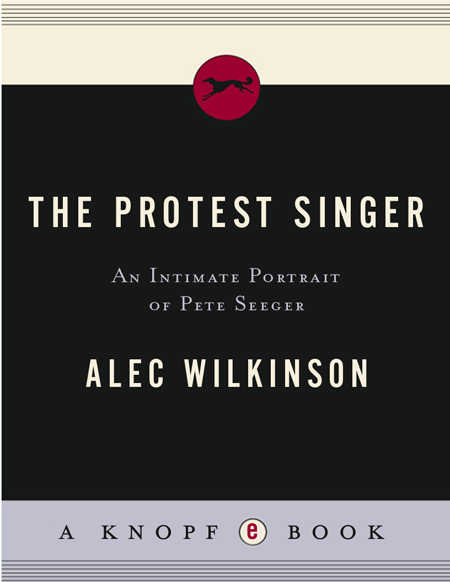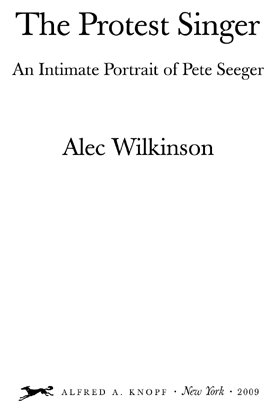ALSO BY ALEC WILKINSON
The Happiest Man in the World (2007)
Mr. Apology (2003)
My Mentor (2002)
A Violent Act (1993)
The Riverkeeper (1991)
Big Sugar (1989)
Moonshine (1985)
Midnights (1982)
FOR
TIM DICKEY
Now they took Pete Seeger before the law,
put him on the witness stand,
but he stood right up to tyranny
with just a banjo in his hand.
Such a righteous banjo picker,
watching out for me and you,
that was just a man that wouldn't back down
on three chords and the truth.
Three chords and the truth,
three chords and the truth,
the only crime Pete Seeger done
was three chords and the truth.
He sang his freedom songs real good,
he's still getting his message through,
you better check out old Pete Seeger on
three chords and the truth.
from Three Chords and the Truth,
Ry Cooder
I T WAS THE AMBITION of the singer and songwriter Pete Seeger as a child, in the 1920s, to be an Indian, a farmer, a forest ranger, or possibly an artist, because he liked to draw. He went to Harvard, joined the tenor banjo society, and studied sociology in the hope of becoming a journalist, but at the end of his second year he left before taking his exams and rode a bicycle west, across New York State. If he en countered a group of people making music on a porch or around a fire, he added himself to it and requested that they teach him the songs. He was tall and thin and earnest and polite. To eat, he made watercolor sketches of a farm from the fields, then knocked on the farmhouse door and asked to trade the drawing for a meal.
In the late 1940s, Seeger belonged to a group called the Almanac Singers, which included Woody Guthrie. The name derived from there being in most working-class homes two books, a Bible and an almanac, one for this world and one for the next. The Almanac Singers appeared mainly at strikes and at rallies supporting the rights of laborers. Seeger says that the band was famous to readers of the Daily Worker, the newspaper of the Communist Party. The Almanac Singers broke up in 1942, after Seeger was drafted. Following the war, Seeger performed on his own, then became a member of the Weavers, whose version of Goodnight, Irene, by Huddie Ledbetter, called Leadbelly, was, for thirteen weeks in 1950, the best-selling record in America. The Weavers quit playing in 1952, after an informant told the House Un-American Activities Committee that three of the four Weavers, including Seeger, were Communists. (Seeger knew students at Harvard who were Communists, and, idealistically he became one for several years, too.) Following the informant's testimony, the Weavers found fewer and fewer places to work. Seeger and his wife, Toshi, decided that Seeger should sing for any audience that would have him. They printed a brochure and sent it to summer camps, colleges, schools, churches, and any other organizations that they thought might be sympathetic. Seeger began engaging in what he calls guerilla cultural tactics. Arriving in a town he'd been hired to play in, he'd call the local radio station, where the disc jockey, remembering the Weavers, would usually invite him to talk on the air. Seeger would discuss his concert then play that night and be gone before anyone had time to object. In towns where his appearances were more widely publicized, he grew accustomed to walking past pickets holding signs saying Moscow's Canary and Khrushchev's Songbird. In How Can I Keep from Singing, a biography of Seeger, David Dun away writes that a poll conducted during the period by Harvard said that 52 percent of the American people thought that Communists should be put in jail.
In 1955, a promoter brought the Weavers back together for a concert at Carnegie Hallhe had told each of them that the others wanted to. The concert sold out, and they began performing again. Seeger left them in 1958. One of the songs from their catalog, Pay Me My Money Down, the lament of an indignant longshoreman, appears on We Shall Overcome/The Seeger Sessions, a record made by Bruce Springsteen in 2006. The other twelve songs on the record are versions of songs that Seeger recorded and tended to sing on his own.
Springsteen began listening to Seeger in 1998, when he was asked to provide a song for a Seeger tribute record (Where Have All The Flowers Gone, Appleseed Recordings). To choose one, he went to the record store and bought every Pete record they had, he told me. I really immersed myself in them, and it was very transformative. I heard a hundred voices in those songs, and stories from across the span of American historyparlor music, church music, tavern music, street and gutter musicI felt the connection almost intuitively, and that certain things needed to be carried on; I wanted to continue doing things that Pete had passed down and put his hand on. He had a real sense of the musician as historical entityof being a link in the thread of people who sing in others' voices and carry the tradition forwardand of the songwriter, in the daily history of the place he lived, that songs were tools, and, without sounding too pretentious, righteous implements when connected to historical consciousness. At the same time, Pete always maintained a tremendous sense of fun and lightness, which is where his grace manifested itself. It was cross-generational. He played for anyone who would listen; he played a lot for kids. When I set the musicians up in my house to make this record, and we started playing Pete's songs, my daughter said, That sounds like fun, what is that?
The Seeger Sessions does not include any songs that Seeger wrotesuch as Turn, Turn, Turn, which sold nearly a million records for the Byrds, in 1965. Springsteen recorded If I Had a Hammer, but felt that it asserted itself too forcefully among the rest of the songs, possibly because it was so well known. The thirteen songs he chose, he said, are ones that I heard my own voice in. When you're going through material that way, you're always trying to find your place in the story. That's your part in the passing down of that music. You have to know what you're adding. Every time a folk song gets sung, something gets added to that song. Why did I pick Pete Seeger songs instead of songs by the Carter Family or Johnny Cash or the Stanley Brothers? Because Pete's library is so vast that the whole history of the country is there. I didn't feel I had to go to someone else's records. It was very broad. He listened to everything and collected everything and transformed everything. Everything I wanted, I found there.
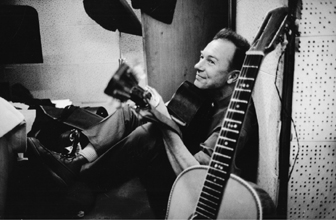
SEEGER FIGURED in the lives of my parents and older brothers, but I am not the right age to have been much aware of him at firsthand. I heard him sing only once. I remember standing one night in August with my brothers and my mother and father in a parking lot among people who towered over me, and waiting until a tall, thin man with a banjo came out the back door of the town hall in Wellfleet, Massachusetts, and sang several songs on a landing. I suppose I was five or six, meaning it would have been 1957 or 1958. Being among a crowd at night was a novelty for me, and because of that, and the close attention everyone paid, it was a dramatic occasion, but I don't remember the music. Only years later did I learn why Seeger meant so much to the people gathered to hear him, and how rare a person he is.


